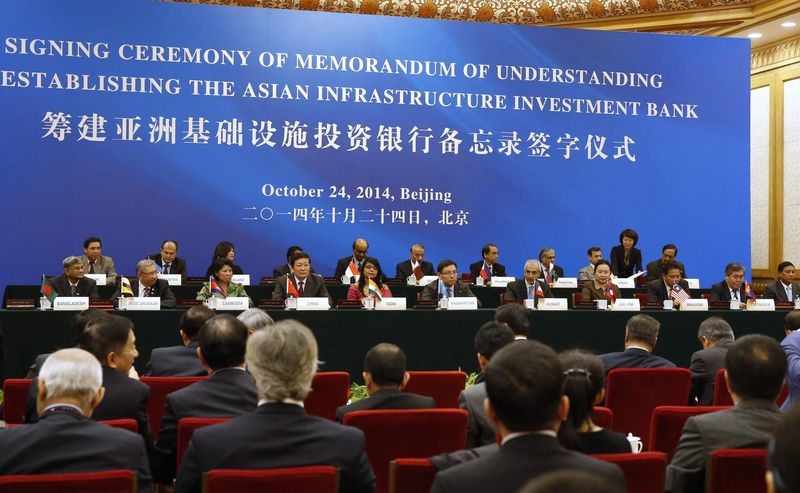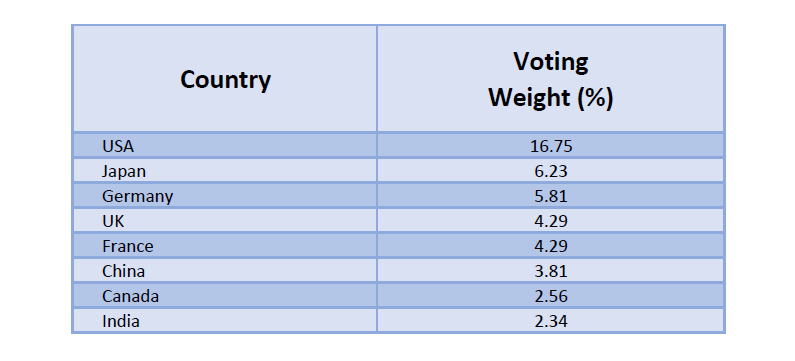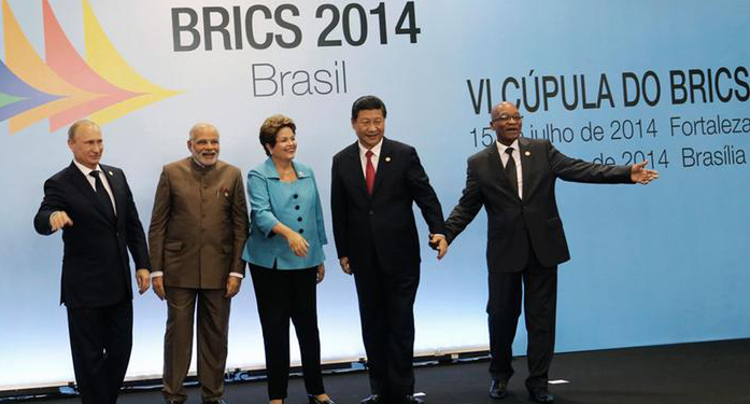
The news came like a shock from the blue. The well-manicured poodle that always woofed yes and waited lovingly for the half-chewed bone from master White House announced last week that it was going to join the China led Asian Infrastructure Investment Bank (AIIB) by the end of March. The news shocked the White House. They came out with these statements.
[quote_box_center]
This is the UK’s sovereign decision. We hope and expect that the UK will use its voice to push for adoption of high standards.
We are wary about a trend toward constant accommodation of China, which is not the best way to engage a rising power.
Our position on the AIIB remains clear and consistent. The United States and many major global economies all agree there is a pressing need to enhance infrastructure investment around the world. We believe any new multilateral institution should incorporate the high standards of the World Bank and the regional development banks. Based on many discussions, we have concerns about whether the AIIB will meet these high standards, particularly related to governance, and environmental and social safeguards … The international community has a stake in seeing the AIIB complement the existing architecture, and to work effectively alongside the World Bank and Asian Development Bank.
[/quote_box_center]
They were so surprised that their fellow English speaking poodle also known as “Great” Britain was joining a China led rival to the World Bank. But the English poodle was just being pragmatic. It could smell the new big bull dog on the block so it took this decision in self-interest.
It did not end there. On the heels of the UK, France, Germany and Italy announced that they were going to join the AIIB also. Let us analyze this. The biggest economies in the EU and among the biggest in the world, Germany, Britain, France and Italy were all jumping on a bandwagon to join a China created and China led international development Bank called the Asia Infrastructure Investment Bank. Let us consider what the geopolitical implications are and the lessons and opportunities for Africa with this important geopolitical move.
China as a rising power had for a long time being grieved at the delusional structure of western international financial structures like the World Bank, the IMF, the Asian Development Bank (ADB) and others. Let us take a look at one of them, the IMF.
These are the voting rights of some countries indicating the voting weight of countries in the IMF as taken from the website of the organization that calls itself the IMF.

We note the interesting fact that China the second largest economy or by purchasing power parity the largest economy in the world has less voting power than most of the major western countries. A move to reform the IMF to give greater voting power to developing countries that have increased their share of economic output in the world has stagnated as the US senate has refused to ratify an agreement in that direction.
Of course exceptional and chosen nations do not share to reflect realities. Therefore any self-respecting power would chaff at this for only a short time. Reports started to emerge about China establishing a new bank in October 2013. Then on October 24 2014, at a signing ceremony in Beijing that formally recognized the Asian Infrastructure Investment Bank, 21 countries signed the founding treaty that gave the bank a starting capital of $50 billion dollars provided mostly by China. The list of countries that signed it in 2014 are:
Bangladesh, Brunei, Cambodia, China, India, Indonesia, Jordan, Kazakhstan, Kuwait, Laos, Malaysia, Maldives, Mongolia, Myanmar, Nepal, New Zealand, Oman, Pakistan, Philippines, Qatar, Saudi Arabia Singapore, Sri Lanka, Tajikistan, Thailand, Uzbekistan and Vietnam.
New Zealand a western country which has China as its largest trading partner defied Washington and signed it. The case of the Philippines is interesting. The Asia Development Bank which is controlled by Washington through its main shareholder Japan is headquartered in Manila. Japan has always appointed the head of the Asia Development Bank.
Now the Philippines has joined a rival institution. Interesting times indeed. The United States leaned heavily on Australia and South Korea not to join. But the surprise announcement by Britain, France, Germany and Italy to join the China led rival to the Washington dominated World Bank, IMF and the Asia development Bank has caused Australia and South Korea to announce that they were reconsidering their earlier decisions.
Let us note the following comment by George Osborne the British Chancellor of the Exchequer about a motive for joining the China led bank:
[quote_box_center]By encouraging Chinese investments in the next generations of nuclear power plants, Osborne announced that the City of London would become the base for the first clearing house for the yuan outside Asia.[/quote_box_center]
This development is significant as it represents a power financial chess move by China to restructure global financial power to its advantage. As this new bank rivals and out eclipses the western institutions like the World Bank, IMF and the Asian Development Bank, it would throw into question the rationale for the maintenance of the US dollar as the reserve currency and currency of choice for trade.
For it does not make sense to use the currency of a country the US while China is the largest trading nation in the world. Most consumer goods produced and traded in the world are of Chinese origin. While on the other hand, the US only exports dollars (apart from democracy drones and bombs). We can well remember that the appearance of the US dominated World Bank and IMF after 1945 served as the springboard for the dominance of the US dollar in global trade.
This is not all. There is another powerful bank which is being formally established this year. It is called the New Development Bank (NDB) established by the BRICS countries Brazil, Russia, China, India and South Africa. It will also have a starting capital of $50 billion dollars which will later be increased to a $100 billion dollars. Brazil, Russia, China, India and South Africa will each contribute $10 billion dollars. The bank will be headquartered in Shanghai China.

An African regional center will be based in Johannesburg South Africa. The first president of the NDB will be from India. The chairman of the board of directors will be from Brazil and the chairman of the board of governors will be from Russia. The structure of the Bank is interesting. Unlike the World Bank which assigns votes based on capital share and major countries have a veto, the NDB is structured in such a way that each country as a member of the bank will get only one vote and no country has a veto power. The bank will begin lending in 2016.
What should be Africa’s reaction to this? Let us first look at the Africa Development Bank group (AFDB) which comprises the Africa Development Bank, the Africa Development Fund and the Nigeria trust Fund.
The Africa Development Bank is formally an Africa led bank which has a current capital structure of 60% provided by African countries and 40% provided by western donors. But we can ask what the real share is provided by African countries, if we keep in mind that most African countries have more than half their budget financed by the west.
There the real share of African countries might be of the order of 20 to 30 percent. The case of the Africa Development Fund is even more pathetic. The largest shareholders of the Africa Development Fund are the US, Britain and Japan with the Federal Reserve Bank of New York being the depository bank. Therefore the AFDB group is controlled by non-Africans namely the west. China decided to establish a new multilateral agency to protect and push its interests.
We propose the establishment of an Africa Development and Infrastructure Bank (ADIB) which is wholly owned by African countries. Where will the capital for this new bank come from? Recently Kazakhstan announced a currency swap with China to settle Kazakh-China trade. Kazakhstan is not much more advanced than many African countries.
We propose that African countries pool their local currencies into a currency matrix as the starting capital for the bank. This currency pool can be backed by the annual mineral resources production of both industrial and non-industrial minerals in the participating African countries. An African country needed financing can access this local currency pool to access the products it needs for its infrastructure needs from other African countries.
If those African countries do not have those resource materials and goods, the ADIB can through a complex of currency swaps with non-African countries facilitate the procurement of the goods and services not provided or produced in Africa.
If Kazakhstan can facilitate currency swaps for trade with China bypassing the US dollar, African countries should have the courage to do that through an Africa wide Africa Development and Infrastructure Bank which will have the clout to negotiate exo-African (outside Africa) currency swaps for trade and investment.
The geopolitical system of global power is shifting fast from the declining west to Asia and other rising powers. It is indeed time for Africa to formulate its response to the changing geopolitical realities in the financial sphere among other spheres.










The surge of change is often slow from a distance. But when it finally gets close, it is swift – very swift.
China day is coming. The question is, where is Africa?
Africa’s day might look slow and drudgery from the distance; but when it arrives, that too will be swift, very swift.
I had to use your quote, it was a tad too tempting. Forgive my tautology!
Evolution is slow but it is patient. It knows not from whence her future goes, but when it gets there, it will know! Africa is evolving, in a constant state of flux. We are a polyrhythmic people – we don’t follow one law, one doctrine, one language, one goal, one religion. We gave humanity consciousness and the world realization. No doubt, we are evolving, albeit slowly. But we are.
How might we see a Chinese domination of world economics? Better than the Brighton woods institutes fro Africa? I think not. Not for Africa. America and Europe might not be our friends, but China is no brother. Let us keep this simple thing in mind lest we dash our feet against the stone. Only an African Bank can serve the supreme interests of Africans.
The day African countries would realize the fraud that is the IMF and the World Bank, they will quickly transform. An African Bank truly dedicated to African interests is a fight we are ready to have. No two ways about it.
RCEP is the 1st among a pack of aces fielded by PRC in COVID times for the struggling nations of the ASEAN ! RCEP has knitted the ASEAN into the PRC garment.dindooohindoo
The PRC has identified for the world,the “gateway to enter PRC”, via ASEAN. As time passes,wage increases and the rise in cost of living,in urban agglomerations,will provide the impetus to outsource,and shift manufacturing,to ASEAN.Rising costs are a signal,of the obsolescence of the business model and technology – and the driver,to re-engineer the manufacturing value chain.
This outsourcing to ASEAN,will soak up the entire manufacturing capacity of ASEAN,boosting profits and wages in ASEAN nations.Chinese can partake in this wealth creation,in the ASEAN nations,as under:
Lending to ASEAN companies by Chinese Banks like CCB etc.
VC and PE stakes in ASEAN companies,with exits on the HKEX or NYSE
JV with ASEAN companies
Hence,there will be a continuous pipeline of transfer of technology and products from PRC to ASEAN at a competitive cost,and with a stand-by financing from Chinese Banks.
This will make the ASEAN people and the ASEAN governments DEPENDENT on PRC,and enable ASEAN to be partners in the PRC success story.Thereafter,excluding Nippon and South Korea,no other nation will ally with the Americans,and might also, not allow their ports,to be used by the US Navy – as the financial and economic loss,will be tangible and huge – with no ostensible strategic benefits,to the ASEAN nations.
RCEP has knitted the ASEAN into the PRC garment.
Meanwhile PRC companies can focus on AI,Robotics and Nano to drive up the manufacturing value chain – with collaborations with EU companies and keep the Chinese skilled workers at the cutting edge of change.
Simultaneous with the above, the RCEP region (minus Nippon and Australia) can use the Yuan as the FX and even conclude agreements with OPEC or Saudis,and other Break Bulk Raw Material supply nations,to settle all purchases in Yuan (for the RCEP,as trading block).
History,Geneaology,Providence,Culture and Geography,have destined PRC and ASEAN,to be an integrated block.
What place does India have,in the block ?
Nippon and Aussies bring in technical and management excellence (which India never had )
Pakistan HAS to be given a choice to join RCEP,on the thesis that any SEZ of PRC,or a ASEAN owned SEZ o/s ASEAN, with an investment of,in excess of say,USD 35 Billion,can be DEEMED to be an EXTENSION,of the RCEP.
POST RCEP, The Path for EU manufacturers is as clear,as the white sand on a black clay beach.German manufacturers have to relocate to ASEAN,for manufacturing,and THEN export to PRC,else they will lose tarriff and non-tarriff costs,of at least 5-10%.
For those who complain about manufacturing regulations in PRC,and the costly and complex legal systems in PRC,the solution is to make in ASEAN,and seek legal redressal in ASEAN – and further,export their output to PRC.This will also secure the EU manufacturers,who wish to secure their assets,in democracies”.
The inevitable crisis of AI,Nano and Robotics,will make most humans redundant,even in EU manufacturing.The least the EU can do,is to offshore production to ASEAN,to crash the costs for EU consumers – so that,if the EU has to feed 200 million people (after they are rendered redundant),they can be fed at the lowest cost.
If the EU is PROTECTING its markets and industry, from the Chinese invasion,and thus, forfeiting unrestricted access for EU exporters to the market of PRC – that is a disaster -as the current manufacturing in EU,will ,in any case, become obsolete.